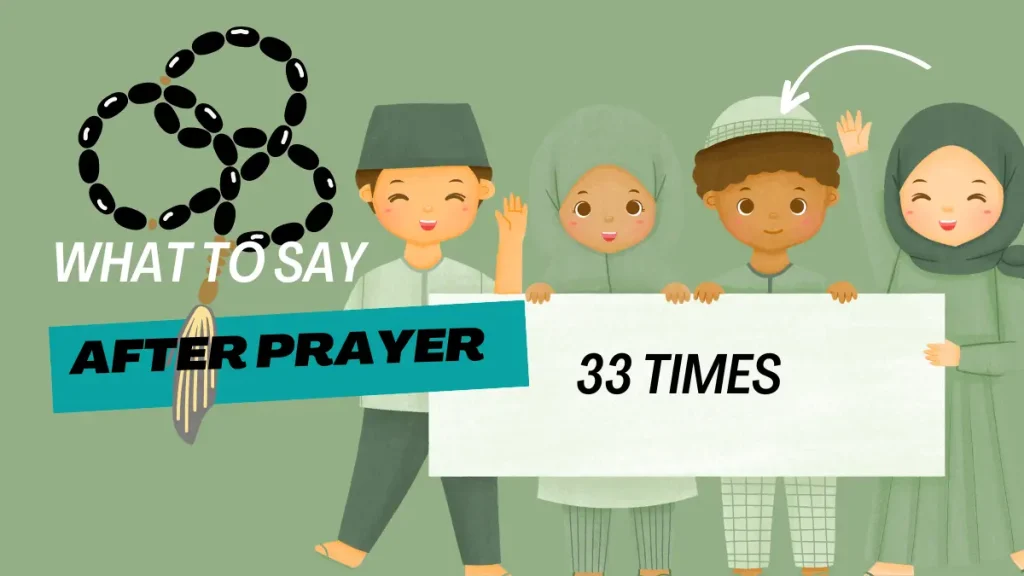After prayer you can say Subhanallah 33 times, Alhamdulillah 33 times, Allahu Akbar 33 times, this is Sunnah. After that 1 time
لَا إِلَهَ إِلاَّ اللَّهُ وَحْدَهُ لَا شَرِيْكَ لَهُ لَهُ الْمُلْكُ وَلَهُ الْحَمْدُ وَهُوَ عَلَى كُلِّ شَىْءٍ قَدِيْرٌ
Pronunciation: La ilaha illallahu wahdahu la sharika lahu. Lahul Mulku. Walahul Hamdu. Wahua Ala Kulli Shayin Qadir. Or 100 can be completed with Allahu Akbar.
Meaning: There is no god but Allah. He is single. He has no partners. He is the owner of sovereignty. All praise to him. He is capable of everything.
The Prophet (PBUH) said that a person who reads Subhanallah 33 times, Alhamdulillah 33 times, Allahu Akbar 33 times after every obligatory prayer and recites this dua (La ilaha illallahu wahdahu…) 1 time will complete all his sins a total of 100 times. will be forgiven; Although it is the amount of sea foam. (Sahih Muslim: 1380).
B. Dr. If you can’t do the prayer, complete 100 by saying Allahu Akbar 1 time.
Why do you say after prayer 33 times?
It is mentioned in the Qur’an, when My servants ask you about Me, say – I am near. When the caller calls me, I respond to his call. So let them respond to my call and believe in me, so that they may follow the right path, and attain perfection’ (Surah Baqarah: 186).
Benefits
When the Messenger of Allah (pbuh) used to return the greetings of prayer, he would say loudly – ‘There is no god but Allah; He is One, He has no partner, His is the dominion and His is all praise. He is omnipotent. Apart from Allah we have no helper, no means and no power. There is no god but Allah. We worship none but Him. To Him is the blessing, to Him is the grace, to Him is the best praise. There is no god but Allah.’ (Sahih Muslim Sharif).
The Messenger of Allah (PBUH) said, “Whoever recites 33 times Subhanallah, 33 times Alhamdulillah and 33 times Allahu Akbar after every prayer, Allah will forgive all his sins, even if the sins are the size of the foam of the sea.” (Sahih Muslim).
How to say tasbeeh 33 times after prayer?
Tasbeeh should be recited slowly and beautifully with clear pronunciation. Think about it, because of rapid pronunciation where you mean to say – ‘subhanallah’ it becomes – ‘subhanallah’ which is a meaningless word. It has no virtue. Rather, there is a fear of sin due to distorted pronunciation.
See, we recite various tasbeehs, dua-durood for the satisfaction of Allah Rabbul Alamin. But reciting tasbih in such a fast and wrong pronunciation is a kind of blasphemy. It is of no use. By this there is a danger of becoming a sin instead of a virtue.
Therefore, all types of tasbeeh-tahlil, dua-durood and recitations read with these tasbeehs should be done in a clear pronunciation, correctly, slowly and beautifully. Only then will it be beneficial. Allah will be pleased. May Allah grant everyone the tawfiq to complete all good deeds in the right way.
FAQs
What prayer is typically recited 33 times?
The “Subhanallah” prayer, which means “Glory be to Allah,” is often recited 33 times as a form of dhikr (remembrance) in Islam.
Why is the prayer recited 33 times?
Reciting the prayer 33 times is associated with the tradition of the Prophet Muhammad, who recommended saying it after each obligatory prayer as a means of seeking forgiveness and blessings.
Can I recite the prayer at any time of the day?
Yes, you can recite the prayer any time, but it’s especially recommended after the five daily prayers or during other moments of reflection and devotion.
What are the benefits of reciting the prayer 33 times?
Reciting the prayer 33 times is believed to bring spiritual benefits, including the remembrance of Allah, the purification of the heart, and the seeking of forgiveness for sins.
Can I recite the prayer silently or aloud?
You can recite the prayer either silently or aloud, depending on your preference and the circumstances. The important thing is to focus on the meaning and intention behind the prayer.
Is there a specific time or place I should recite the prayer?
While it’s recommended to recite the prayer after the obligatory prayers, you can also recite it at any other time and in any suitable place where you can focus on your devotion to Allah.
How can I incorporate the prayer into my daily routine?
You can incorporate the prayer into your daily routine by setting aside specific times for remembrance and devotion, such as after each prayer or during moments of quiet reflection throughout the day.
What if I forget to recite the prayer 33 times?
If you forget to recite the prayer 33 times on a particular occasion, you can make it up later or strive to be more consistent in your practice in the future. The important thing is to maintain sincerity and devotion in your worship.
Is there any specific etiquette I should observe while reciting the prayer?
While there’s no strict etiquette, it’s recommended to recite the prayer with humility, sincerity, and focus on the meaning of the words. Additionally, performing ablution (wudu) before prayer is encouraged for greater spiritual purity.







